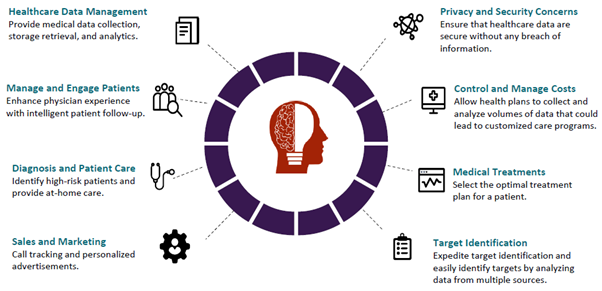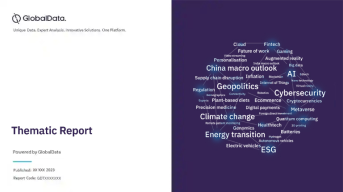Smart Pharma – Thematic Research
Powered by ![]()
All the vital news, analysis, and commentary curated by our industry experts.
The COVID-19 pandemic acted as a trigger and accelerated the uptake of smart technologies across the pharmaceutical sector. Unsustainable pharmaceutical business models and the challenges presented by the COVID-19 pandemic have illustrated a strong need for innovation to improve business agility, continuity, and resilience. Innovative technologies offer the pharmaceutical industry the ability to increase efficiency, create agile operational models, and innovate processes within its value chain. Companies that embrace smart technologies more quickly will be better positioned to gain a competitive advantage and reduce financial risks. With the increased use of innovations such as remote patient monitoring (wearables, telemedicine, and digital health, the emphasis on patient centricity instead of brand centricity will continue to change the pharma industry’s drug development and marketing strategies.
Smart technologies include IoT and sensors, artificial intelligence, big data/ analytics, robotics, blockchain, cloud, 5G, and others. AI and Big Data will continue to dominate as the main disruptive technologies in the pharmaceutical sector.
Benefits of Smart Technology Integration
The unsustainable pharmaceutical business models and the COVID-19 pandemic uncovered a strong need for innovation in the sector in order to increase business agility and resilience. Across all regions, the majority of the surveyed healthcare industry professionals highlighted the fact that the pharma industry needs to capitalize on innovations to gain real-time visibility across its value chain, improve both operational processes and efficiency, get better integrity and usage of Big Data, facilitate a shift toward patient centricity, and improve the R&D processes.
Challenges that Can be Resolved Using Smart Technologies
For more insights on the benefits of smart technologies, download a free report sample
Smart Technologies in Drug Discovery and Development
AI and big data/analytics are expected to play a major role in optimizing drug discovery and development processes. The pharmaceutical industry is data-driven. With the increasing volume and complexity of data being generated by the sector from multiple sources, the need to organize and streamline information is a constant challenge.
Smart Technologies in Manufacturing
The use of robotics in the pharmaceutical industry is neither new nor uncommon. However, as technologies advance, improvements in automation technology can lead to substantial enhancements beyond productivity increases. The implementation of robotics can result in better compliance, consistency, and operational excellence. With improved product safety, patient safety can be improved as well.
Smart Technologies in Supply Chains
Globalization has resulted in the use of increasingly complex, but weakly connected, pharmaceutical supply chains. Lack of visibility is a common root of many challenges faced by the industry. By disrupting nearly every part of supply chains across the entire healthcare industry, the COVID-19 pandemic highlighted a strong need for improvement and change. The pandemic uncovered inconsistencies in inventory management practices and long-established procurement processes.
Smart Technologies in Sales and Marketing
For many companies, the success of a new drug depends on how well it is marketed and what ROI is generated. From the beginning of the COVID-19 pandemic, traditional in-person sales representative visits sharply declined due to both social distancing and lockdown measures. Pharmaceutical companies were forced to adapt rapidly to this new world and train sales representatives to use virtual tools to stay connected with physicians Increasing reliance on the internet to access information was also pushing pharma companies to improve end-user experiences with their products and services.
Disruptive Emerging Technologies
AI, big data, APIs and digital platforms, social media, cloud computing, cybersecurity, 5G, and biometrics are some of the most emerging smart technologies in pharma. The growing field of AI is drawing increasing amounts of interest from pharma, which hopes that it can help deliver new pipeline candidates faster and more efficiently. AI and Big Data in healthcare are linked Use of the former will continue to grow rapidly, especially when considering the amount of data that can now be mined from patient records and registries, real world evidence (sales and marketing, and connected devices
Closer Look at AI and Big Data in Pharma
For more insights on the emerging technologies, download a free report sample
Smart Pharma Report Overview
| Report Pages | 99 |
| Regions Covered | Global |
| Emerging Smart Technologies | IoT and Sensors, Artificial Intelligence, Big Data/ Analytics, Robotics, Blockchain, Cloud, 5G, and Others |
Scope
- In this Smart Pharma report, GlobalData examines the integration of smart technologies across the pharmaceutical industry value chain, assesses COVID-19 impact on the uptake of smart technologies in pharma and the importance of partnering with technology vendors to enable a roll-out of innovative technologies.
- A total of 155 GlobalData Pharma clients and prospects participated in the 10-minute survey, which was fielded from April 21, 2021, to May 18, 2021.
- In this report, smart pharma refers to the incorporation of new technologies to improve and enhance processes such as drug development, manufacturing, supply chains, and sales and marketing.
Components of the report include:
- Adoption of Smart Technologies in Pharma — highlights the main challenges and benefits associated with the implementation of smart technologies within the pharmaceutical industry providing respondent mix by region and company size.
- Drug Discovery and Development – assesses the smart technologies that are expected to play a major role in optimizing drug discovery and development process and highlights the current and future technologies uptake.
- Manufacturing – examines the smart technologies that are expected to play a major role in optimizing pharmaceutical manufacturing process and highlights the current and future technologies uptake.
- Supply Chains – evaluates the smart technologies that are expected to play a major role in optimizing supply chains and highlights the current and future technologies uptake.
- Sales and marketing – assesses the smart technologies that are expected to play a major role in optimizing sales and marketing process and highlights the current and future technologies uptake.
- Pharma and Tech Collaborations – showcases how the pharmaceutical industry is partnering with external technology vendors to increase the implementation speed, efficiency, and reliability of new technologies.
- A Closer Look at Big Data and AI — highlights the importance of Artificial Intelligence and Big Data in the pharmaceutical industry.
- COVID-19 Impact – assesses COVID-19’s impact on the acceleration of smart technologies uptake.
Reasons to Buy
- Discover the benefits and challenges associated with integrating smart or innovative technologies into the pharmaceutical industry.
- Explore how smart technologies are transforming the pharmaceutical industry value chain and what impact on the pharmaceutical sector these technologies will bring.
- Develop and design your corporate strategies by understanding which technologies are set to play a major role in transforming the pharmaceutical value chain.
- Identify how the pharmaceutical industry is partnering with external technology vendors to increase the implementation speed, efficiency, and reliability of new technologies.
- Stay up to date on COVID-19’s impact on the acceleration of smart technologies uptake.
Table of Contents
Frequently asked questions
-
What are the key challenges that can be resolved using smart technologies?
Target identification in drugs and development, packaging in manufacturing, traceability in supply chains, and market planning in marketing and sales are some of the key challenges that can be solved using smart technologies.
-
What are the emerging smart technologies?
IoT and sensors, artificial intelligence, big data/ analytics, robotics, blockchain, cloud, 5G, and others are the emerging smart technologies.
-
Which smart technology is going to emerge in sales and marketing?
In sales and marketing, big data/analytics will continue to be the most important smart technology.
-
How did COVID-19 affect the emergence of smart technologies in the pharma sector?
Even though the pharmaceutical sector has tended to display a more conservative stance toward the adoption of new technologies, the COVID-19 pandemic acted as a trigger that forced companies to accelerate their digital transformation timeline
Get in touch to find out about multi-purchase discounts
reportstore@globaldata.com
Tel +44 20 7947 2745
Every customer’s requirement is unique. With over 220,000 construction projects tracked, we can create a tailored dataset for you based on the types of projects you are looking for. Please get in touch with your specific requirements and we can send you a quote.
Related reports
View more Pharmaceuticals reports











